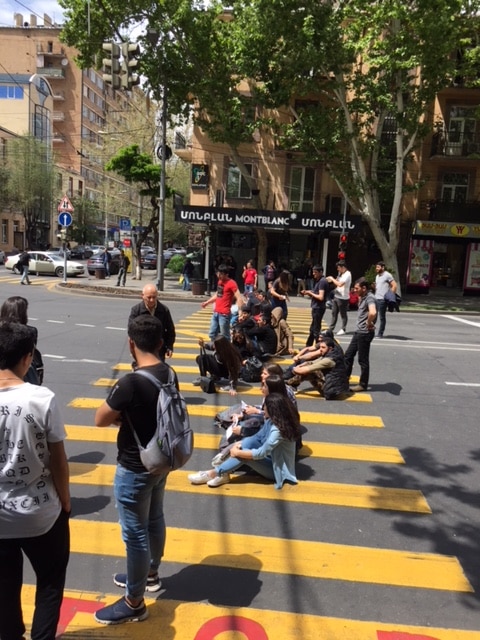Armenia, a landlocked former Soviet republic in the southern Caucasus, broke all the stereotypes of civil involvement and influence on politics by becoming a role model of the most democratic country of the Caucasus region. For almost a month the Armenian people actively took a collective stand to have their voices heard by rejecting authoritarian ruler Serzh Sargsyan and electing their candidate as the new Prime Minister. Sargsyan served 10 years as president of Armenia, during which the country's economic development benefited his Republican Party. At the same time, the Armenian people saw the poverty rate growing to 30%, and thousands of people left the country in search of work.
Mass protests
Opposition leader Nikol Pashinyan was the one who started mass demonstrations. In his speeches he always emphasised that this social movement is an internal, Armenian matter and should only continue within the frames of solidarity, peace and love.
The demonstrators had a clear demand: fair elections, socioeconomic justice and an end to oligarchic control. They realised that all it takes is peacefully going on a strike and blocking the roads, and giving politicians and oligarchs a choice between violent forces or fulfilling the people's demands.
It only took 10 days. Massive street protests and acts of civil disobedience forced the country's longtime leader Serzh Sargsyan to resign from his current position of prime minister. Though initially Sargsyan refused to do so, eventually, considering the extremely serious situation in the country, he resigned on April 23, one day before the commemoration of the 1915 Armenian genocide.
However, after all this the Republican party wanted their candidate Karen Karapetyan to take the position of new Prime Minister. But this time the Armenian people were so motivated and dedicated that they continued the mass disobedience and strikes until their candidate, Nikol Pashinyan, was elected as the new Prime Minister of Armenia on the 8th or May.
A new beginning
The news erupted into joy and happiness, as people in the streets were hugging and congratulating each other on the victory, after all the hardship and struggles. People really have lots of trust in Nikol Pashinyan. He is the shining light, example of a national hero, and a source of inspiration for many young people living in Armenia.
Armenians are very excited by all this and maybe that's why they want to see immediate, short-term effects, which is really unrealistic in the coming months. Nikol Pashinyan is heading the government in a really hard and challenging time, so all we can do is wait and see how he is going to keep his promise by taking on the responsibility of making Armenia a less corrupted and more regulated country with fair pay, better education, employment and health care. In addition to all this, the hardest challenge for Pashinyan will be managing to keep the balance between Russia and the West.
This victory is not the end but the beginning of a new page of Armenian history.
By: Ozheni Avetisyan
Photo: Marina Ohanjanyan





